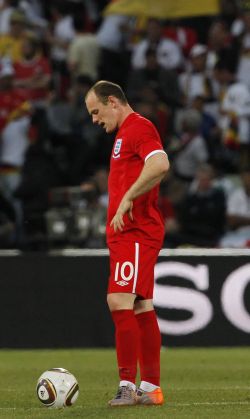A lot of people were saying that on paper, England should have beaten Germany in last weekend’s World Cup match. The problem for England was that the players themselves seemed to believe it.
The argument for England being favourites in almost every game they’ve played in over the last decade or so, regardless of their form (which is usually bad), is that with the kind of players at their disposal they should be expected to beat supposedly “lesser” opponents.
So it was against Germany. The Germans no longer have the imposing reputations of players like Jurgen Klinsmann, Oliver Bierhoff, Lothar Mathaus or even Michael Ballack in the team.
The most recognisable name they have at the moment is probably Miroslav Klose, and even then his stock had dropped considerably thanks to a horrid domestic season with Bayern Munich.
England, on the other hand, have household names like Wayne Rooney, Steven Gerrard, and Frank Lampard, who apparently have even been playing in a lot of Malaysian households this “sum-mah”. Gotta love those ads…
Naturally, people expected England to stroll past teams like the United States, Algeria, Slovenia and even Germany. I mean, Lampard’s in a friggin’ ad campaign right?
The problem with that assumption is that even if you can spell “me” if you rearrange the letters in “team”, there still shouldn’t be an “I” in there.
England’s stars always looked like they were playing as individuals, thinking that by being superstars for their respective club sides, they had a divine right to win games single-handedly – or have a beer whenever they want to in the middle of a World Cup campaign.
Far too often Gerrard attempted 40-yard passes and went on barnstorming runs trying to get past two or three players when the less-glamorous option of trusting his teammates and playing a couple of simple passes would have served the team better.
Rooney often got frustrated when he failed to get that extra yard off opposing defences the way he usually would with Manchester United, and Lampard, though being the only player to emerge with any credit from the 4-1 thumping by Germany, was also guilty of trying some over-ambitious shots from 30 yards and beyond.
Germany on the other hand, were busy playing football, working together as a unit to pick open England’s feeble defence time and again.
Mesut Ozil was a perfect example of what England were missing. For all his exquisite talents, Ozil, 21, had the tactical discipline to play to Germany’s system, keeping the ball nicely and making plenty of runs when he didn’t have it.
Perhaps that’s why Fabio Capello tried to coax Paul Scholes out of retirement. He needed a selfless player in the middle of the park who could keep everyone playing football as a team.
For me, that’s where it all went wrong for England. You can’t expect to do well at the World Cup just because you turn up with a bunch of good players. They have to play well together.
Spain have done so well because they have that great passing game going on. Argentina, for all of Diego Maradona’s madness, have that dogged flair. Germany, as they demonstrated so well against England, have their traditional tactical discipline coupled with a new creative streak thanks to their young stars. Even the South Koreans have that amazing energy and movement that endeared them to so many neutrals.
But what about England? What’s their footballing “style”, apart from boring?
Capello has to take some of the blame, but let’s be real: England have done this to themselves time and again, whether it’s with Kevin Keegan, Sven-Goran Eriksson or Steve McClaren.
Contrary to popular belief, playing Joe Cole would not have made a difference. The fact that John Terry believed that a single player, one who’s been ravaged by injuries and just released for free by his club, could make such a difference in England’s fortunes points towards the team’s reliance on individual talent rather than a collective playing spirit.
Cole is a good player, but if England keep playing the way they do, it wouldn’t matter if they had Lionel Messi on their team.
The saving grace, ironically, is that this England team is getting old. They had the highest average squad age in South Africa at 28.7 years. Germany incidentally, were the youngest at 25.
In a few more years, Capello won’t have the headache of whether to select certain players anymore, players who we all know now beyond a shadow of a doubt cannot play together, and are already cast in the moulds of their respective club sides.
Now he can start with a clean slate and pick players like Gabriel Agbonlahor, Ashley Young or Adam Johnson (and maybe Theo Walcott) for Euro 2012 without fear of a public backlash. Or at least less fear.
These players might not have the superstar status current stalwarts like Rooney and Gerrard had when they were their age, but considering how things have turned out in this tournament, that’s probably a good thing.





Tell us what you think!